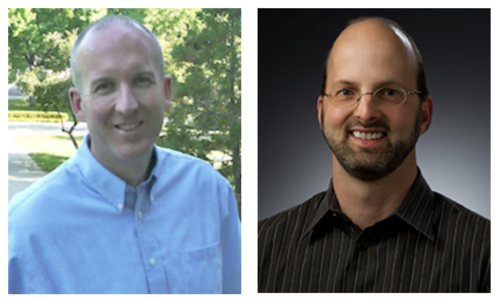
Michael Rea, the Rev. John A. O’Brien Professor of Philosophy, and Samuel Newlands, the William J. and Dorothy K. O’Neill Collegiate Associate Professor in Philosophy, have been awarded a grant from the John Templeton Foundation to pursue questions related to the nature of the self.
The grant supports the planning phase of a large, interdisciplinary project Rea and Newlands are developing — “Narrative Conceptions of the Self in Psychology, Philosophy, and Theology.”
In January, the philosophers will bring together scholars in philosophy, psychology, neuroscience, anthropology and theology to present cutting-edge research related to the question, “How can we understand and make sense of the narrative conceptions of the self?”
The January conference serves a number of purposes, Newlands said, including examining the state of research across disciplines to discover areas of common ground and avenues for new research.
“We also want to work toward consensus and clarity among the various scholarly fields with regard to terminology and vocabulary,” he said. “We’re working hard to make sure researchers from different disciplines don’t end up just talking past each other.”
Rea and Newlands have established a science advisory board to help them prepare aspects of their larger proposal that venture into domains beyond their own areas of expertise.
Related to their overarching question on the narrative conceptions of the self are two ancillary questions — “Who am I?” and “What am I?”
“Developments in psychology during the last 30 years have favored setting aside the ‘what’ query while trying to make progress on the ‘who’ question,” Rea said, “and out of this has arisen a theory called narrative conception.”
Scholars who defend the narrative conception theory argue that — given the way the brain processes experiences and strings together episodic memories — perhaps the resultant narrative is, actually, wholly constitutive of the self.
The skeptics’ rejoinder, Rea said, is, “What kind of thing is it that creates itself?”
Such debates are among those that Rea and Newlands plan to explore with their gathering of scholars in January.
This initiative is the latest in a series of collaborative, interdisciplinary projects Rea and Newlands have spearheaded in the last eight years. Together, they have received close to $15 million in funding for projects exploring the problem of evil, hope and optimism, and religious and transformative experiences.
Notre Dame is an “extremely friendly and fertile environment” for research on spiritually and religiously significant topics, Rea said.
Rea and Newlands, who are also directors of the Center for Philosophy and Religion, said the center has been “an absolute key” to their ability to manage projects like this one.
“We now have a center staff with years of project management experience under their belts,” Newlands said, “and we are all eager to expand the center’s reach and dialogue partners.”
The Center for Philosophy of Religion in Notre Dame’s College of Arts and Letters promotes work on topics in the philosophy of religion and philosophical theology and encourages the development and exploration of specifically Christian and theistic philosophy.
The Templeton Foundation strives to be a philanthropic catalyst for discovery in areas engaging life’s biggest questions, ranging from explorations into the laws of nature and the universe to questions on the nature of love, gratitude, forgiveness and creativity.
Originally published by at al.nd.edu on December 14, 2017.